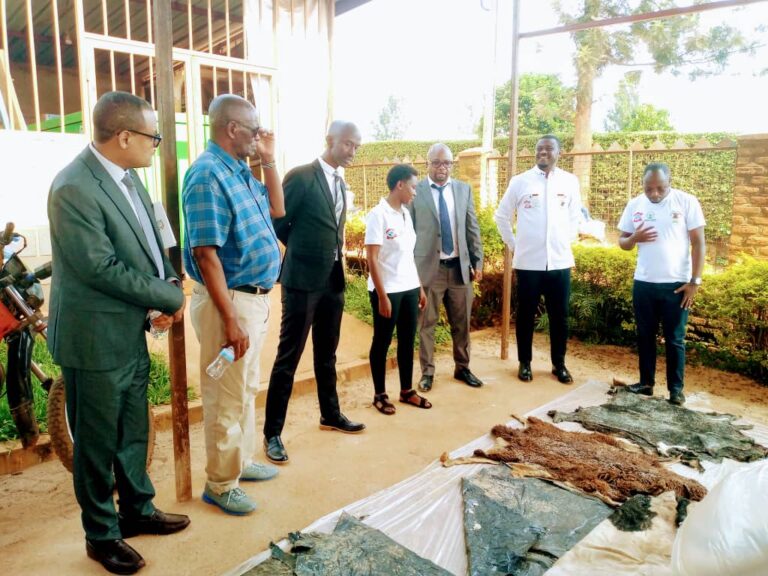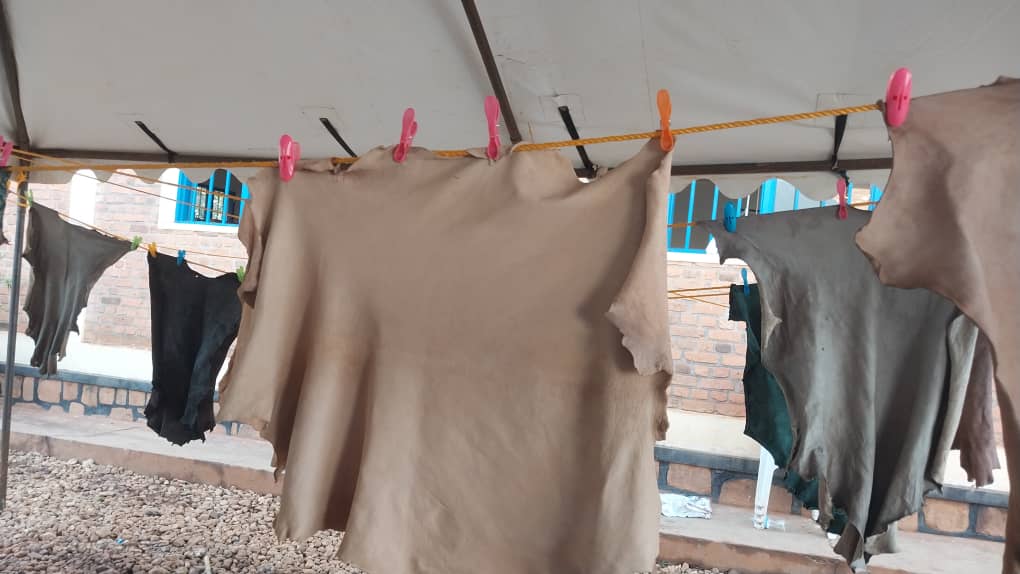
Nicholas Mudungwe, Executive Director of ALLPI (third from right) with Technical Team observing the processing of leather.
Africa Leather and Leather Products Institute (ALLPI) completed a ten-day hands-on artisan leather processing using environmentally sustainable and low-cost techniques. The Masaka Business Incubation Centre in Kigali, Rwanda, hosted the training.
ALLPI is a specialized agency of the Common Market for Eastern and Southern Africa (COMESA), mandated to develop the Leather Value Chain in the region, and collaborates with the Ministry of Industry and Trade to execute its work in Rwanda.
ALLPI programs include the following: Cluster Design and Implementation, Leather Processing and Value Addition, Leather Products Designing and Development, Trade and Investment Promotion and promoting Sustainable Production of Leather and Leather Products.

Leather processed
In its quest to improve value addition, employment creation and improve the availability of quality finished leather in Rwanda, it recently organized a leather processing training.
The objective of the training was to build the capacity of artisans in vegetable tanning and batik dyeing techniques. The program attracted 25 participants (18 men and 7 women) who were drawn from different parts of Rwanda and ran from the 6 th to the 15 th of May 2024.
The training accomplished its objective because the artisans were able to process raw hides into finished leather. They also made leather products like sandals, wallets, closed shoes, and key holders using the leather they had produced.
Three ALLPI officers, Mr Harison Mungai, Dr Abdel Rahim M. Ahmed and Mrs Beza Jima, executed the training. An official from the Ministry of Trade and Industry (MINCOM) Republic of Rwanda opened the training workshop. He expressed his pleasure and honour on behalf of MINICOM to welcome ALLPI and the participants.
He stated that the workshop was aimed to equip the artisans with practical vegetable tanning skills, enabling them to produce leather for those involved in leather footwear and goods in Rwanda. He further added that MINICOM recognizes the importance of the artisans and MSMEs in driving the economic growth of the sector, urging them to take the opportunity to enhance their capacity to produce quality finished leather.
Mr. Nicholas Mudungwe, Executive Director of ALLPI, and Mr. Mugabe, Director General of MINICOM, attended the graduation ceremony, which was held on 15 May 2024 at Masaka Incubation Centre.
Mr. Mudungwe, in his remark, thanked the Government of Rwanda for facilitating the training and also thanked the Secretary General of COMESA for her support of industrialization and the promotion of intra-trade in Africa.
Mr Mudungwe underscored that Rome was not built in one day, and thus, the artisans should continue to work hard under clusters with the support of the Government and other interested stakeholders. He encouraged trainees to apply the skills in their businesses because the training was meant to enable them to produce leather, which is in short supply in the country.
Furthermore, he advised them to think big and work to transform their business from small to large scale, as several large companies in the world started as cottage industries. He informed the trainees that ALLPI is designing mini and environmentally friendly tanning equipment, which will be piloted next year in Member Countries. The mini tanneries will enhance the quality, volume, and competitiveness of the leather that the artisans will produce.
In his closing remarks, Mr Mugabe, the Director General at MNICOM, thanked ALLPI for the amazing work, which saw artisans transform raw hides into finished leather and leather products. He asserted that the leather sector is one of Rwandas top priority sectors. Furthermore, Mr Mugabe encouraged the Kigali Leather Cluster to start processing leather to partially fulfil the demand for leather in Rwanda.
ALLPI will continue to support the trained artisans working in partnership with MINICOM and the Kigali Leather Cluster leadership. The Kigali Leather Cluster now has 600 members and is displaying a high level of vibrance under the leadership of Mr. Kamayirese Jean D’amour.
Forming a fertile ground for stimulating the development of the leather value chain in Rwanda and the COMESA Region. (End)
